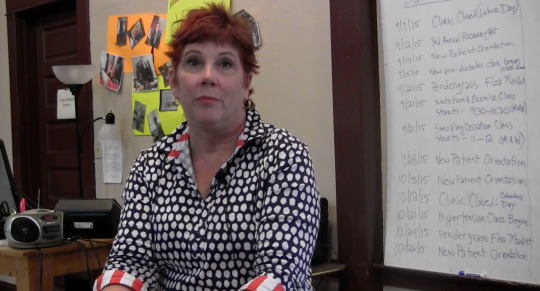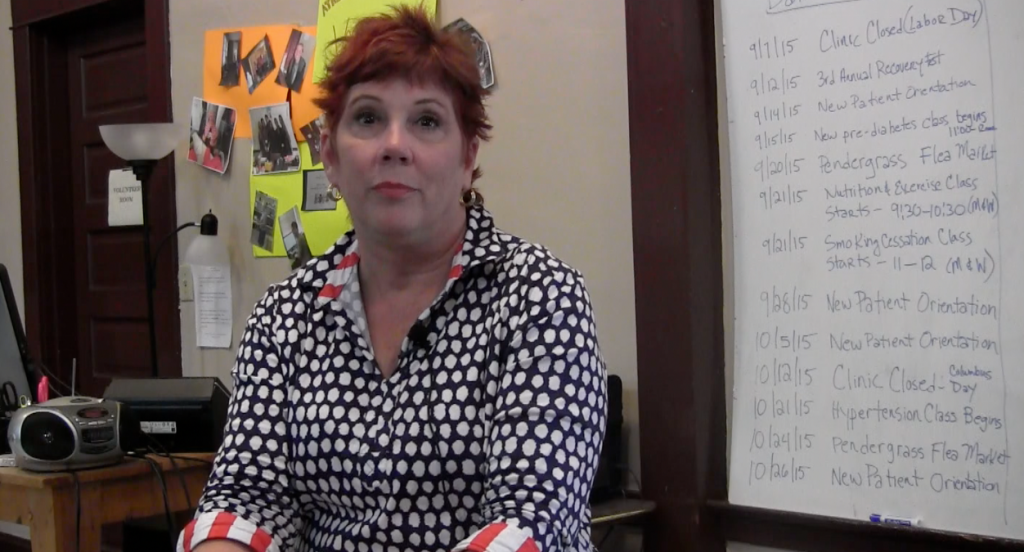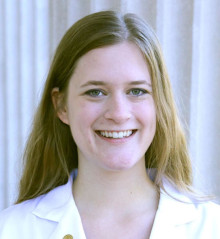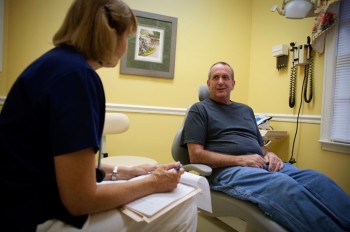
Annie Robinson was working a Wednesday evening shift at Mercy Health Center in Athens when a familiar patient came in for a prescription refill.
Robinson checked the woman’s blood pressure and other vital signs and authorized refills for medicines she could pick up immediately from the health center’s pharmacy. The patient left, and the second-year medical student was preparing to call in the next person.
But surprisingly, the patient soon reappeared. She retraced her steps through the busy waiting room, cruising past anxious first-year medical students who were sure she was working up to a complaint. She headed straight to Robinson. And then she spoke.
“God bless the work that you are doing,” she told the surprised young med student.
At that moment, Robinson was moved to recall why she had wanted to become a doctor in the first place, why all the studying and test-taking were so worthwhile, and how grateful she was to be part of the student-run clinic at Mercy Health Center.
The clinic provides medical, dental and mental health care to underserved and uninsured people in Athens and surrounding counties.
Mercy is housed in a one-story, white-painted building at the rear of a small medical complex. It looks nothing like the ultra-modern, impressively equipped hospitals or doctors’ offices that allow medical students to come in and assist with surgery, pediatrics or psychiatry.
But unpretentious surroundings don’t faze Robinson and her classmates. In fact, the medical school they attend is not a giant facility with a tradition that goes back generations. Georgia Regents University-University of Georgia Medical Partnership, an offshoot of the state’s public medical school in Augusta, has been in business for only four years, and the class has just 40 students.
The need is great
Athens, though rich in history and beauty and renowned as an academic center, is far from the stereotype of a neat, sedate college town. It’s a bustling city, with a large number of residents who live in poverty and are unable to afford proper medical care.
Although some low-income patients are eligible for Medicaid, Athens has fewer than 10 doctors who will see new Medicaid patients. Other patients have some sort of insurance, but rarely use it because they can’t afford the deductibles and co-pays.
People such as these don’t have a lot of options. In Athens, there are only three places where they can count on treatment. Mercy is one. The other two are the Nurses Health Clinic, which serves indigent patients at no charge, and the Athens Neighborhood Health Center, which serves people with and without health coverage.
All three clinics provide some training opportunities for Medical Partnership students, but Mercy Health Center is the only one with an on-site clinic organized and staffed by students.
The student-run clinic began in 2010, when the medical program first launched. It serves as a unit of Mercy, and patients who come into Mercy on Wednesdays are seen by the students.
The students originally planned to open a freestanding clinic on the grounds of their school, “but they realized that just down the road was Mercy, which had a facility and had patients who needed to be seen,” said Dr. Laurel Murrow, an internist who teaches at the medical campus and is also medical director for Mercy Health Center.
The clinic is open every Wednesday from 4:30 p.m. until 7:30 p.m., and teams of first- and second-year medical students take turns treating patients under the supervision of one of the clinic’s many volunteer physicians.
Robinson and Andrew Caudill, both in their second year of medical school, are two of the four students who manage the operation. Their job includes making sure the facility is adequately staffed and running smoothly.
“This is one of the only opportunities in your first and second year to actually provide real patient care,” says Caudill.
It’s a learning experience, which is another way of saying that there are some real challenges for these novice medics.
“From a first-year perspective, a lot of these patients do have very complicated, chronic medical conditions,” Caudill said. “So just trying to understand that can be challenging.”
People with little or no money, whose priorities have been limited to food and shelter, can go years without visiting a doctor or hospital. By the time they turn up at Mercy, they have many medical needs.
“These patients get a lot of attention that they would probably not get at a regular clinic, because there are all of these people spending time with them,” Caudill says. “So we are both benefited.”
Robinson agrees that it’s a win-win situation.
She notes that the academic grind in medical school can sometimes seem like an end in itself. “These first two years, it’s not uncommon to lose sight of” what doctoring is really about, she says, “but Mercy helps keep us grounded.”
“It’s real world,” says Murrow, Mercy’s medical director. “They see what it’s like to practice medicine, and our patients are generally very grateful for the services provided.”
A sense of excitement
Slightly more than two miles away, a handful of medical students volunteer to assist patients at the Athens Neighborhood Health Center. This is a federally qualified health center that serves patients with private insurance, as well as those on Medicaid or Medicare, and people with no insurance coverage at all. Its patient mix is somewhat different from Mercy’s, including many children as well as adults.
[youtube]https://youtu.be/U-a-ZoKh39o[/youtube]Also nearby is the Athens Nurses Clinic, which like Mercy concentrates on caring for patients with very little money and no insurance. First-year medical students have volunteered there as part of a community outreach project. They are not far enough along in their course work to actually provide patient care, but they have taught popular smoking cessation courses to the patients.
The future doctors “need to get experience from all different areas, including community clinics,” said Paige Cummings, executive director of Athens Nurses Clinic.
Mercy’s student-run clinic reopened this month after the summer hiatus, and Robinson and Caudill recruited help from all 40 first-year students, who will be working on their own student-physician teams.
Caudill and Robinson were excited and a bit nervous about this autumn debut.
“To me it’s not practice. It’s more like opening night,” Caudill says. “You’ve done the practice, and it may not be polished yet, but you’re still providing care.”
“We are students and we need help with learning,” Robinson says. “The patients need help as well, and the benefits are mutual. We get to kind of help each other. It’s nice to be able to do some real-world good.”
Sydney Devine, from Valdosta, is currently a second-year graduate student in the Health and Medical Journalism program at the University of Georgia. She works as a research reporter for the university and is interested in health issues in low-income communities.



